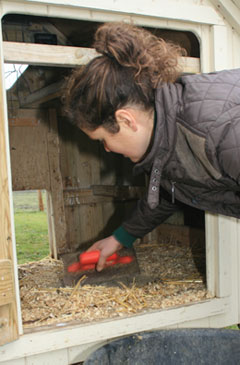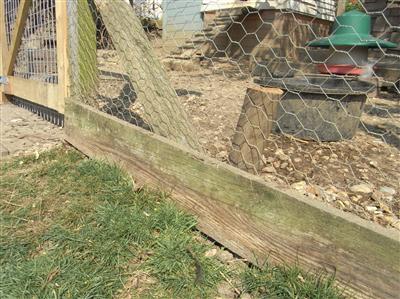Foxes are the number one predator of our chickens in the U.K (unless of course you live on the Isle of Man where there are no foxes!)

Foxes usually rip the heads off chickens and will kill as many birds as they can in a frenzy if they manage to get into a run or coop. Foxes usually get into a run by digging and squeezing under a fence or by going over the top of a fence. Fences need to be buried at least 8 inches deep with the wire then curled flat outwards by another 8 inches. They can clear a 5 foot fence with ease. Remember foxes are more like cats than dogs and can jump!
Foxes can also tear rabbit wire fences with their teeth – it is best to keep fences taught and ideally use the I inch rectangular wire as this is thicker, stronger and they can’t get their teeth into it.
They will squeeze through the smallest of gaps… but don’t take my word for it, this short clip shows him in action!
Foxes usually work alone but towards the end of summer, sometimes the Vixen will hunt with her cubs to teach them.
When are your chickens at risk?
Foxes are generally nocturnal creatures, hunting under the cover of darkness; however when there is a large population of foxes or a shortage of food as is often found in the urban environment, they can start to become a pest during the daytime. Young cubs that are just finding their own food often stay out until mid morning, I frequently see them playing on the bales of hay in the fields near my home in late June and July and from time to time they will come into my garden.
The winter is obviously a dangerous time for chickens when food is short, however the time when most of us get caught out is June to August. Cubs are learning to hunt on their own, will often come early evening or morning when it is light and don’t have the fear to stay away from us.
If your chickens free range, a fox may make a dash, grab a chicken and run off. During these risky times, you may need a small secure run to house them when you are out but there are other options. Electrified poultry netting works wonders at keeping them safe in a large area and you may be able to speak to your local game keeper if you have a problem fox that is very determined.
Do you have any advice on Foxes? Please leave a comment below if you do.






Hi, we live in a rural area of Central France and have kept chickens here for 6 years. We lost some to pine martins early doors, as a result of which the coop is now like Fort Knox. During the day, our hens roamed free over 5 acres of woodland.
This week we lost 6 hens and our cock to a young fox, whom we saw in the evening as he returned for the remainder of his kill. He took some away, buried one and we tidied the rest up. The attack took place while we were out but in the early evening, well before dusk.
We miss the hens dreadfully and want to have some more, but don’t know how to go about it. Dare we try some more in the open, might the fox move on as any young grow older? If we have to prepare some sort of run, we need advice on how big is should be, what type of surface to provide, shade, all the usual things, I guess.
Sorry for going on at length but any help you can offer would be much appreciated and will doubtless help other people visiting the site for advice.
Many thanks, Dave Shaw
Hi Dave,
Firstly, I’m sorry to hear The fox got your chickens.
Secondly, he won’t move on. They are territorial and will certainly stay where there is a source of food.
But finally, the answer should be easy enough for you. Over a large area, I use an electric fence. This allows the hens to free range and keeps them safe. There are lots of units in the French agricultural shops I have seen. Have a look at the page on electric fences, also on the poultrykeeper.com website. Basically you can add it to an existing fence or build a new one.
A fox will investigate a fence first before deciding how to cross it. His nose will touch a wire and he will get a shock and learn not to cross that fence.
As a minimum, you need a low level wire so he can’t dig around 6 inches off the ground. This needs regular clearing of weeds / grass to stop it shorting. A 2nd wire should be offset from the fence on insulators about 6 inches out from the fence at nose height and then a third offset for the fence at the top.
The fence need not be too tall, mine is chest height but electric poultry netting people use is only 1.2m tall.
A final option is to put a wire at fox nose height on separate posts a few feet from the fence. This seems to work really well at keeping him away from the fence in the first place. It only needs small stakes a couple of feet long put in the ground and some cheap insulators.
Make sure the fence energiser has a good earth spike in the. Ground to complete the circuit.
Don’t forget it’s only as good as being turned on and many people lose birds when a battery has gone flat and the fox senses it’s switched off!
Good luck and hope you get some more birds.
Thanks very much for the helpful response. The problem we have is that our hens roamed free over 5 acres, producing the most amazing eggs we’d ever seen! We’ll need a Plan B now, which will involve an electric fence – its getting the balance right that’s the difficult thing. We really loved to see them scratching around in the garden, and laying in the sun next to us as we ate our lunch outside. I suspect now we’ll have to find a way of keeping them in a safer environment whilst still being able to enjoy their company. We’ll give it a go, though! Thanks again, Dave
What I did for one of my runs was fence off about 1/3 of an acre with slightly taller than normal post and rail then added electric wires. Inside, I have planted half a dozen fruit trees to make an orchard. The hens love it and I have since partitioned it with another fence so I can alternate their pasture which is good for worms and allows the grass to recover in winter. It’s nice to be able to see the chickens from the house and know they are safe and in a couple of years, we should have an established orchard that is well manured by the chooks.
We have about 80 chickens in a large open pen, and another smaller pen that is used for breeding. A couple of nights ago a fox (or foxes) came and killed 2 chickens and another 3 disappeared without a trace, all out of the breeding pen. Is it possible that the chickens ran away? Or could the fox(es) have taken them without any evidence?
It sounds to me like a fox attack. They can grab a hen and carry her off and come back for more. If you searched the local area, you would probably find the kill site where there are a few feathers.
Hi, just last night we lost our 3 pet chickens. I got up this morning to find one missing, two with their heads pulled off and one of those partially buried. Feathers were everywhere!! Even outside our bedroom window and we didn’t hear a thing. We live in Australia and it’s winter now. I have seen a fox once but does this sound like a fox attack? My children and I are very sad. I thought having chickens was much of a muchness but I found the opposite. They were lovely and so sociable. Regards Jane
Yes,this sounds like a fox. That’s how they kill and they will bury food for later.
Hi, feeling devasted today, i lost one of my girls to a fox yesterday, it was around 7pm so the fox was clearly feeling very brave. I have a dog but he wasn’t in the garden unfortunatley, the first night in ages i have had my windows shut so i didn’t hear the commotion. I got close enough to the fox to almost touch it, it had no fear whatsoever. He/she is obviously very poorly it has no fur down the back of it and also has a problem with its back leg.
I locked my other two girls back in their run (totally fox proof) and two hours later bold as brass the fox comes back, this time my dog chased it off. Do you think that this would be enough of a deterrent for it not to re-appear?
I want to replace Omlet but am concerned that the other two girls won’t accept a new chicken the three of them have been together since the start and get along like a house on fire. Hilda our White Sussex is also broody at the moment so am i best waiting.
I am considering electric fencing as i don’t want to keep the cooped up in their run, although it is big enough they just love to free range. They only do this when i am there which is another reason i am so upset because i could have stopped it happening if only i had heard it.
Sorry to babble any advice would be greatly appreciated.
Thanks
Helen
I would wait until you have sorted your fox problem. He will come back (they always do) and the only choice you have is a secure run for your hens or remove the fox humanely.